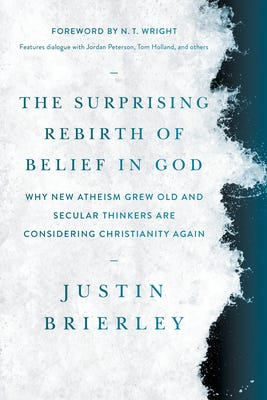Is Christianity rising again? A review of Justin Brierley's "The surprising rebirth of belief in God"
Why the arguments for faith are persuasive once again
It’s not often I read a book about events I’ve watched from a front row seat. That was my experience of reading “The surprising rebirth…”, and I found reliving the past 15 years of public debate about Christianity thoroughly enjoyable. I was not as close an observer as the author, Justin Brierley, who ran the radio show-turned-podcast Unbelievable at Premier for years, inviting interesting thinkers of all faiths and none to debate the issues, and refereeing the sometimes turbulent discussions in his fair and measured style. I have worked alongside Justin and occasionally been on the show, as well as writing for the Christian media throughout the time.
In this book, Justin tells the stories of multiple public thinkers and their move towards God: including historian and author Tom Holland and controversial psychologist Jordan Peterson. Some are what’s sometimes called “Christian adjacent,” or warming to the idea but not there yet, like feisty conservative writer Douglas Murray.
Others are fully signed up: environmentalist and former Wiccan environmentalist Paul Kingsnorth and author Francis Spufford, for example. Since the book came out, we’ve also learned that Ayaan Hirsi Ali, once a staunch atheist, has become a Christian.
There’s no doubt that this book is responding to a real cultural shift. When I came to faith in the late noughties, there were very few public figures who openly discussed faith. Even those who claimed to have one didn’t talk about it, like Tony Blair. There were very few journalists. There was Peter Hitchens, though at the time he was treated like a right wing bogeyman for standing up for traditional Christian values like law & order, preserving life and protecting families. I think Anne Atkins and Peter Oborne were believers, there were a few Catholics at the Telegraph and the Spectator, but none of them talked about it publicly very much. The main spokespeople for the faith in the public square were the bishops of the Church of England, who were not usually the most inspiring examples, to be frank.
It was the time when “new atheism” was gathering momentum especially in bookshops. Richard Dawkins’ ‘The God Delusion’ was published in 2006, Christopher Hitchens’ ‘God is not great’ the following year, and they and others like them were ranting away, all over the media, denigrating religion as the pointless pastime of idiots at best, the inspiration for insatiable evil at worst.
As Justin documents, (and as I wrote about back in in 2016) this cultural onslaught had the opposite effect on the church than that intended by its protagonists. The church awoke from its slumber and reinvigorated its rich intellectual tradition. It did this with good, rational arguments that positively made the case for Christianity, especially through the work of quality thinkers like apologist William Lane Craig and philosopher Alvin Plantinga, but also by pulling at the threads of the holey jumper that was the militant atheists’ rationale, which disintegrated rapidly.
The intellectual weakness of Dawkins et al. isn’t what really did for them. They were slain by a force that continues to dominate public thought and the church, too: the social justice warriors, pejoratively dubbed the “woke”. They have become the dominant voice in society, though not without pushback. The outcome of this new movement hasn’t been determined yet, though there are other good quality, serious thinkers approaching the subject from a Christian point of view - surprisingly often on the same “side” as people like Dawkins, these days.
This book isn’t really about these more recent cultural shifts, but does a great job of recording the effects of ‘new atheism’ and the green shoots of Christian faith that we now see spring up in the secular landscape.
I suspect that in the coming years, the dominant motivation for people returning to Christianity will be rising alarm at the deterioration of our common life that we see all around us (though as I wrote for The Critic, Christianity can only save us, if it is true). There is a lot of despair and worry that our future will be much worse. I believe one of the main reasons for our difficulties is the decline of Christian faith and values in Western society; I think more and more people will recognise this, too. It’s going to be an interesting time to be a thinking Christian, and an important one in which to act.



